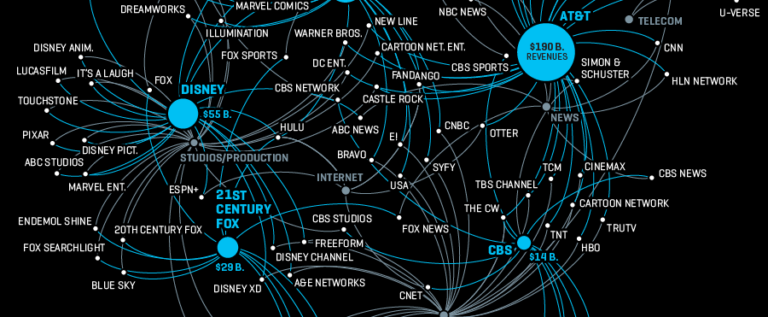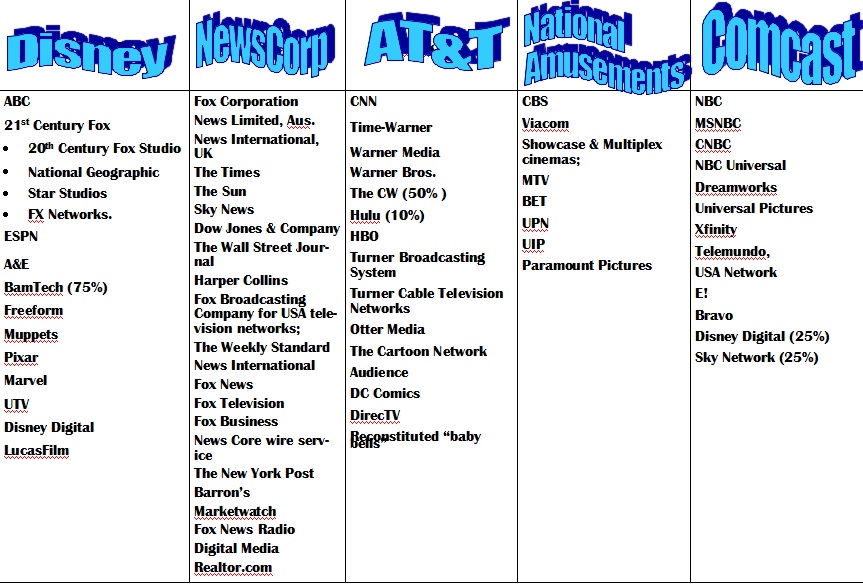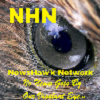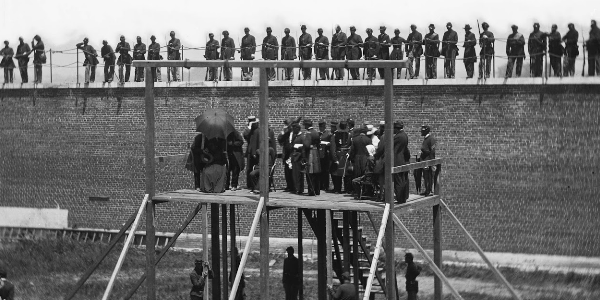Captive Press: Destroying The Myth of Free & Independent

This is the second installment on the captive media series. The first article focused on 13 individual billionaires that own and control a large and significant aspect of the ‘captive’ media that is ‘feeding information’ to multiple millions of American consumers daily. A free and independent press requires two things: Freedom and Independence, the two things woefully absent in the corporate dominated media. This article highlights the dominant corporations that control over 90% of the media and illustrate why they are neither free nor independent.
The mass media influences how facts are viewed and debated and as such represent an essential aspect on how public opinion is ‘crafted’ according to the Media Ownership Monitor. Therein is a clue to the problem inherent in our dystopic media in that they want to ‘craft’ public opinion rather than having the ‘honest facts’ craft opinions.
The corporate ‘legacy’ media prefers to force-feed their conclusion with a false presentation of ‘distorted facts’ to consumers, often for their own self-interest rather than those of the individual and nation they are citizens of. The independence and pluralism of the media is for consumers to express their opinions, views and criticisms of those in power whether they be government or corporate. That was designed to safeguard a free and healthy society as the primary duty of fourth estate.
My dealings with many convince me they don’t understand the four estate. Many errantly consider the fourth estate as the fourth branch of government and unfortunately that tends to come from the media itself. Let’s take a moment to superficially review the four estates as they were established long ago:
1. Ecclesiastic: the spiritual role of the church and synagogues
2. Monarch: The state as in national government and the power elite
3. Commoners: The subjects and the people (the public) who comprise the citizenry of those nations
4. Media: The free and independent press to deliver truthful and accurate information as ‘watchman’ of the first three estates with special attention to the second estate.
This is not the place for a treatise on the four estates though that would be a laudable endeavor. The listing will have to suffice for the present, for this writing will highlight how the corporate structure has woefully failed in fulfilling the role, purpose and function of the fourth estate.
In fact the depth and breadth of the utter corruption of humanity is to a high degree the cause or effect, depending upon perspective, of the catastrophic failure for each of the four estates. Regardless of perspective the result is the surrender to lawlessness, depravity and debauchery of each.
The good news is we are also in a period of great restoration and those who have usurped control are none too happy about the coming renaissance. Nonetheless, come it shall. Those in control of the fourth estate have perverted the free flow of truth and information. How are people to rely on information unless they know and understand its source, or in this case those who own and control the what, how and why information is or is not reported?
Journalism is dead because the corporate masters have killed it and generously reward those who make sure it never rears its ugly head or gets resurrected. A controlled media is the tool of suppression, censorship and control over what the the third estate reads, watches, hears and thinks. It goes back to paragraph one where the masters ‘craft’ public opinion. So for us commoners its important we know are these media masters are to properly determine who is steering the narrative?
Who Controls The Media?
In the not so free world of socialism, fascism, communism, oligarchies, globalists and all other form of totalitarianism and tyranny, the governing entities or the second estate often with the help and blessings of the first estate assert their control over the public, through the media. its content and narrative often more effectively than it does through legislation. In the Western nations the fourth estate is the free and independent press, but was it really ever free and independent? When we look at the history of the fourth estate in the United States of America, there is a strong and compelling argument to be made that the fourth estate was never really free or independent since the 19th Century and the advent of the industrial revolution.
In addition to the owners, advertisers to a large extent exerted control and influence over content and what does and does not get reported. The distinction between owners and advertisers are blurred for more often than not they are the same entities. When multinational corporations and the power elite, ‘The Cabal’ as some call it began to have a dominant influence upon or actually seized control over a nation’s currency and economies, the contrast between the second and fourth estate become obscured.
Interlocking Directorates: This is where a person on the board of directors of one corporation, usually where they control the company they helped found or now control, will also sit on several other company boards as a director. This is extremely common not merely with companies within their own industry but others as well. To say this creates conflicts of interest in the greatest understatement of the 21st Century. Media corporations share directors within the media industry and also with technology, pharmaceuticals, banking, brokerage & investment, oil & gas, health-care and many others.
Joseph Goebbels, the NAZI propagandist is credited with saying the following, “A media system wants ostensible control that conceals an actual uniformity” on what needs to happen to achieve control over those you intend to rule. Today that is simply called concentration of ownership. Goebbels is said to have been influenced by the writings and teaching of the leftist activist and originator of the term ‘community organizer’ Saul Alinsky, who also profoundly impacted Barack Hussein Obama and Hillary Rodham Clinton.
Concentration of Ownership: Generally defined as the process of fewer individuals and/or organizations owning or controlling increasing shares of the mass media through mergers and acquisitions, buyouts, consolidations, and controlling positions of stock ownership. A strategy to consume or destroy the smaller independent media providers dwindles competition. Those entities absorbed often retain their distinctive name, but not their distinctive ownership, management and operational control.
Of course this control is indiscernible to the general public in spite of the blurbs received through business publications. This masking and concentration of ownership is perhaps the single greatest threat to a free and independent media; and in many ways the reason for the continuing decline in public trust and viewership.
In 1983, fifty corporations dominated most of every mass medium and the biggest media merger in history was a $340 million deal. … [I]n 1987, the fifty companies had shrunk to twenty-nine. … [I]n 1990, the twenty-nine had shrunk to twenty three. … [I]n 1997, the biggest firms numbered ten and involved the $19 billion Disney-ABC deal, at the time the biggest media merger ever. … [In 2000] AOL Time Warner’s $350 billion merged corporation [was] more than 1,000 times larger [than the biggest deal of 1983].
Barbadian, Ben H, The Media Monopoly, 6th Ed., Beacon Press, 2000 pp. xx-xix
Today there are five companies, though some want to argue more, that control 90% of all the media. The dominate players of the fourth estate is fluid and change frequently. Dinosaurs become extinct and the “too big to fail” is the mantra of tyrants and totalitarians.
Recently new players have emerged in the digital realm, but unfortunately their character is no different than those who occupy the traditional media technologies. While the players have changed, the character, or lack thereof remains the same. The new players in the digital realm are facebook, twitter, Yahoo, Microsoft and Alphabet/Google.
Microsoft has merged with NBC cable to form MSNBC now owned by Comcast; and Alphabet is a multinational conglomerate created in 2015 due to a Google restructure and is now the parent company for Google and their former subsidiaries: Calico, Chronicle, Dandelion, DeepMind, GV, CapitalG, Verify, Jigsaw, Sidewalk Labs, Waymo, X, Loon, and Google Fiber are Alphabet companies. In 2018 they acquired Redux, a startup company in smartphone technology. According to CEO Eric Schmidt, there may be up to 26 subsidiaries moving forward.
Google remains their internet related businesses brand and includes: Nest Labs; Android Mobile Operating System; YouTube, LLC, and Google Search. Online media companies may become the new media moving forward so keeping a close eye on what emerges here will be important.
The media’s abandonment of the duties and responsibilities as stewards of the fourth estate are reprehensible. The corrupted story story continues while only the platform and genre has changed. The totalitarianism that they all embrace is not satisfied by feeding the masses a distorted perception but goes beyond by censoring those who would dare to offer a more accurate portrayal of facts and a narrative that differs and exposes their corruption.
This highlights the failure of the first estate to fulfill its duty as well. We are in a period of catastrophic failures and magnificent reformation. A synergy musty exist between all four that unfortunately does not exist for the good. A new honest, free and independent media must emerge to reestablish that which has been miscreant. The new fourth estate will usher in a new paradigm shift anchored by citizen journalists.
Let’s list the top five major corporate players for 2019 and discuss the notable media properties they own and/or control. These companies are in a fast-paced, highly fluid situation regarding mergers and acquisitions, partial and joint ownership, licensing, distribution rights and the like.

Disney
Disney is an American mass media and entertainment company that owns its own cable company and theme parks. In 2014 it acquired Maker Studio multi channel network on YouTube for $500M and changed the name to Disney Digital. It own 75% of BAMTech streaming VOD and will replace Netflix as its provider in 2019. It is scheduled to acquire 21st Century Fox in June, 2019 for $71.3 Billion and rebrand under the Disney name. That acquisition includes the 20th Century Fox film studio, National Geographic, Star India, and FX Networks.
Notable Properties: ABC, ESPN, A&E, Freeform, Muppets, Pixar, Marvel, UTV, Disney Digital and Lucasfilm.
21st Century Fox
21st Century Fox is the new corporation formed from the asset split in 2013 to form two new publicly traded companies. 21st Century is oriented toward media and News Corp took on the role of publishing and Australian broadcasting assets. 21st Century Fox will be a Disney company come June, 2019. It created Fox Corporation to spin-off the assets not being purchased by Disney and expected to launch a separate company sometime in February or march, 2019.
Notable Properties: Fox Entertainment Group, 20th Century Fox; Star Studios, Hulu, Fox Corporation: Fox Broadcasting Company, Fox Television Stations, Fox News, Fox Business and others.
News Corp: is a American and Australian multinational mass media corporation owned and managed by Rupert Murdoch and his son Lachlan. News Corp is selling off its film and television corporation, 21st Century Fox to Disney in June, 2019 for $71.3B.
Notable Properties: Fox Corporation; News Limited, Australia; News International, UK: The Times, The Sun; Dow Jones & Company; The Wall Street Journal; Harper Collins; Fox Broadcasting Company for USA television networks; The Weekly Standard; News International; Fox News, Fox Television, Fox Business, News Core wire service; The New York Post, Barron’s, Marketwatch, Fox News Radio, Digital Media, Realtor.com.
Comcast
Controlled by far-left democrat and billionaire globalist Brian L Roberts, the son of Ralph Roberts the founder of Comcast Corporation. Brian is the Chairman and CEO and controls one-third of the voting stock in Comcast, an American communications conglomerate; holding company; broadcast, cable, home telephone and internet service provider. Roberts is connected to 9 board members in 9 organizations across 13 different industries.
He brought the Comcast revenues from $657 Million in 1990 when he first became President to $85 Billion in 2018. Though Comcast failed in its efforts to purchase Time-Warner Cable and 21st Century Fox, this failure resulted in the acquisition of a 25% interest in Sky News currently owned by Fox Corporation. The sale is scheduled to complete around March, 2019.
Notable Properties: NBCUniversal, Dreamworks, Universal Pictures, NBC, Xfinity, Telemundo, MSNBC, CNBC, USA Network, E!, Bravo, Disney Digital, and Sky Network.
National Amusements
American billionaires Sumner Redstone and his daughter Shari privately own National Amusements, a media holding company that owns 1,500 theater companies primarily located in NE United Sates and internationally. Sumner is majority shareholder and Chairman of National Amusements. Shari currently serves as President of National Amusements and Vice Chairman of CBS Corporation, Viacom and MovieTickets.com.
Sumner was forced to resign as Executive Chairman of both CBS and Viacom in February, 2016 at age 92 due to a court ordered geriatric psychiatrist examination demanded by members of the CBS board. Sumner is a life-long democrat though he voted for George W Bush in 2004 citing he’d be better for his company and the economy than John Kerry though he donated significantly to Kerry’s primary campaign. His 2019 net worth is 4.6 Billion according to Forbes.
Notable Properties: Showcase & Multiplex cinemas; Viacom, CBS, MTV, BET, UPN, UIP, Paramount Pictures. There is an effort by Shari Redstone to re-merge CBS with Viacom for CBS was a spin-off of Viacom back in 2006.
AT&T
AT&T is an American multinational conglomerate and holding company. They are the largest telecommunications company in the world and bought all the “baby bell” that were spun-off due to the anti-trust divestiture in 1982.
AT&T acquired Time Warner mass media conglomerate Warner Media for $85 Billion in June, 2018 making them the world’s largest media and entertainment company in the world in terms of revenue. Warner media spun-off Time Inc. in 2014 but retained the name until acquired by AT&T. They are maintaining the name Warner Media for all its film, television, cable and publishing companies.
Notable Properties: Warner Media, Warner Bros, CNN, 50% of The CW; 10% of Hulu; HBO, Turner Broadcasting System, Turner Cable Television Networks, Otter Media, the Cartoon Network, Audience, DC Comics; and DirecTV.
Other Major Global Media Players
Bertelsmann (Germany)
A multinational mass media and publishing company controlled by Christoph Mohn and family offering books, television, radio, music, magazines, and business services. They sold BMG to Sony Corporation of America in 2008 for $1.5 Billion that operates under the name Sony Music Entertainment. They own 250 book publishing houses on five continents. The company had an active role in publishing propaganda for Hitler’s 3rd Reich.
Notable Properties: RTL Group, Penguin Random House, Napster, Bertelsmann Education Group, NYC; Alliant International University, sic California campuses, BDM digital media.
Sony Corporation (Japan)
Sony is a Japanese multinational conglomerate in electronics, gaming, entertainment, music, gaming, financial services, film and television. It purchased BMG music from Bertelsmann.
Sony Corporation of America (SCA): principal business units include Sony Electronics, Sony Pictures film studio, Entertainment, Interactive Entertainment, Music Entertainment and ATV Publishing, Sony Wonder children entertainment; and Mobile Communications.
Notable Properties: Califon: Wheel of Fortune; Jeopardy; Crackle; TriStar TV & Pictures; Culver Entertainment (DVD); Embassy Row; Columbia, Epic, Arista and RCA Records; The Orchard music distributors; EMI Music Publishing.
Hearst Communications
Founded Hearst Corp in 1887 by William Randolph Hearst when he inherited the San Francisco Daily Examiner that his father George purchased in 1880. The business remains in the family and is owned and operated by WR Hearst III and family where he serves as Chairman. Today Hearst Communications is a mass media and business information conglomerate based in NYC and owns 23 newspapers, 29 magazines, 7 television stations and channels, 13 internet businesses, and 14 miscellaneous and business publications
Notable Properties: The San Francisco and The Houston Chronicle, Cosmopolitan TV and magazine, 50% of A&E; 20% of ESPN; Esquire, Good Housekeeping, Food Network Magazine, Harper’s Bazaar, Popular Mechanics, Seventeen, Redbook, O The Oprah Magazine, Fitch ratings and First Databank.
The 13 Media Mogul billionaires discussed in the first article and the companies discussed in this article represent close to 95% of everything American read, watch, listen to in the United States of America. In our next installment we will discuss how most of these media moguls and corporations coordinate the content, messaging and narrative to achieve power and control over those they seek dominion over.
References
NHN: 12 Media Moguls Who Control What You Read, See, Hear and Think
Forbes: These 15 Billionaires Own America’s News Media Companies
RT: How Five American Companies Control What You Think
Pew Research: Media Ownership
Media Ownership Monitor: Ownership Matters
Global Issues: Media Conglomerates, Mergers, Concentration of Ownership
Business Insider: These 6 Corporations Control 90% Of The Media In America
Wikipedia: The Free Encyclopedia






2 comments
Trackbacks/Pingbacks